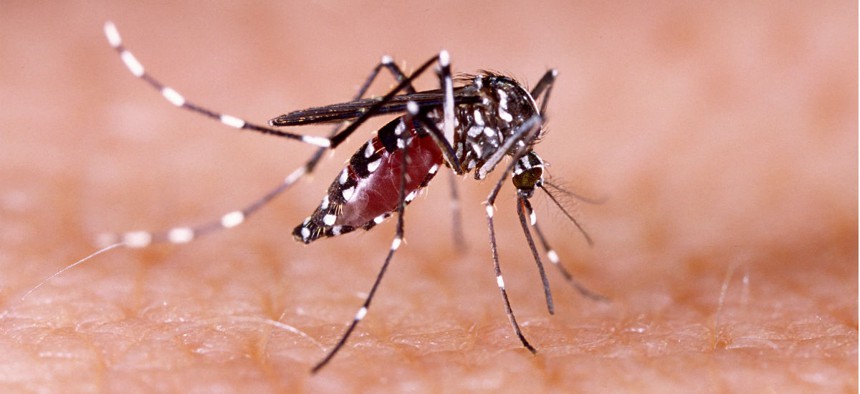
Will Congress Reach an Agreement on Zika?
Lawmakers began formal talks on funding this week, as deadlines loom.
In the nearly four months since the Obama administration issued its $1.9 billion Zika funding request, congressional lawmakers have publicly bickered over each chamber’s response to the virus. This week, select members met formally for the very first time to begin reconciling their dueling ideas. But after a brief session on Wednesday, the end of the debate is not yet in sight—and lawmakers are running out of time.
The discord between members only seemed to deepen last month after Congress’s funding packages for Zika were unveiled. House Republicans think the $1.1 billion in emergency funding the Senate passed is irresponsible. Senators on the left and right say the House’s much lower allocation is insufficient. And there are Democrats in both chambers, along with a few Republicans, who still want to honor the full White House request.
The roughly 15-minute conference-committee meeting on Wednesday was meant for “touching the gloves,” as House Appropriations Committee Chairman Hal Rogers described it—a kickoff for more negotiations to come. Indeed, lawmakers broke into smaller groups afterward to start discussing Zika and a military-related spending bill in presumably more detail. But if public-health officials were hoping for hints as to what form the money will take, they wouldn’t have gleaned any from lawmakers’ statements.
Lawmakers are not just divided over the levels of funding. They also disagree over how Zika should be funded. House Republicans are proud of the fact that their $622 million bill—one-third of the Obama administration’s request—has offsets built in. It siphons money from leftover Ebola funds and other programs to fund Zika through the end of this fiscal year, which ends in September. They say the roughly $600 million already diverted from Ebola coffers has worked well to tie public-health efforts over, and they plan to offer more money in next year’s appropriations package. The Senate’s bill, which would carry into the next fiscal year, is not offset at all.
The conferees that spoke Wednesday, all senior appropriators, were warm and congenial as they laid out top-line goals. Or rather, what seemed to be one goal: to finish their work rapidly. “With mosquito season upon us, these Zika dollars must go out the door now to help control the spread of this disease,” Rogers said. “In addition, funds are needed immediately to continue long-term efforts to stop the disease such as vaccine and treatment development and deployment.”
The debate has taken on even more urgency than before with the arrival of summer, which brings the mosquitoes that play vector for the Zika virus. So far the continental United States has seen hundreds of travel-related cases, but no local transmission. Local transmission is inevitable, though, with warm, densely populated cities like Miami at greatest risk. U.S. territories already have it. Public-health officials will work to contain any outbreaks in the continental states, but they are wary. Officials have long insisted that congressional delays hamper research planning and on-the-ground preparation to contain transmission, along with other ill effects. “Mosquitoes don’t know when the fiscal year ends,” Centers for Disease Control and Prevention Director Tom Frieden told Florida lawmakersat a meeting Wednesday. “This is going to be around for a long time.”
The other deadline looming over lawmakers is Congress’s nearly two-month-long recess this summer, which starts in mid-July. It’s the Senate’s longest in decades, a product of late July’s presidential conventions. Lawmakers are reportedly looking to wrap up Zika funding by the end of this month. Background talks had already started by the time lawmakers convened, but formal negotiations are another animal.
It’s not entirely clear to what degree conferees will concede, particularly House Republicans, whose caucus contains some of the most fiscally hawkish members on the Hill. In an email ahead of the session, Rogers’s spokeswoman said the House bill is his “starting position” and represents what House Republican conferees would be pushing for; though after the meeting was over, his goalslooked a bit more muddled.
During the talks, Democratic lawmakers were slightly more forceful than Republicans in laying out their opening bids. Appropriations Committee Ranking Member Barbara Mikulski said she believes money should be passed as emergency funding, without offsets, while Nita Lowey, her House counterpart, is holding the line at $1.9 billion—with no offsets either. “If we don’t act quickly and forcefully to respond to the threat of Zika now, we will face its costs for years to come,” Lowey said.
Senator Roy Blunt, a senior appropriator and conferee, predicted last week that House Republicans could come around to the Senate’s $1.1 billion bipartisan proposal. Patty Murray, Blunt’s Democratic counterpart, said in a post-meeting statement that they need to do just that. “Time is not on our side,” Murray said, “and since we have a bipartisan agreement on a strong first step in response to Zika, we shouldn’t waste another moment getting it signed into law.”
Lawmakers channeled optimism as they discussed their capacity to get the hard work done. More talks and meetings are expected, though no dates or details have been released. Perhaps their attitude is a sign that members are as tired of inaction as public-health officials are. Or perhaps, after four months of fighting, they don’t have any other option.







